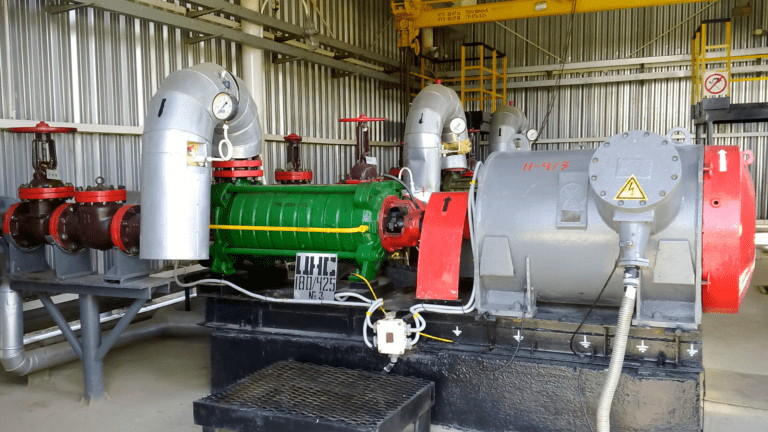 When you think of a compressor, odds are good you think about refrigeration first.
When you think of a compressor, odds are good you think about refrigeration first.
After all, the compressor is the central part of any refrigeration or cooling device. It compresses refrigerant gas to get it to the right volume and does most of the mechanical work necessary to move it through the system.
What many people don’t realize is that the compressor plays the same vital role for a heat pump. After the gas in a heat pump is compressed, it heads to the indoor or outdoor condenser coil for heat exchange. Several problems can strike the compressor and bring heating to a sudden stop.
What Are the Most Common Reasons a Compressor Goes Bad in a Commercial Heat Pump?
Through the magic of thermodynamics, the compressor does all the work you need whether you’re heating the air or cooling it. As with cooling applications, it’s important to realize that the compressor is not the most likely source of your breakdown. In fact, checking your refrigerant levels is a good step in the right direction.
In many cases, a compressor is still sound and functional when other components around it malfunction. Depending on the nature of the problem, the compressor can sustain damage at the same time.
If a compressor has been maintained regularly, you can usually rely on it to operate without complaint for about ten years. At this time, performance degradation becomes a fact of life and it’s time to start planning for a replacement. Maintenance costs can also grow over time, and if they rise sharply, replacement may be in order.
Every now and then, however, the compressor really is at fault. A reciprocating compressor is more likely than other models to fail early in life due to the mechanical wear and tear caused by constant contact between the pistons that drive the compression process. However, other types of compressors can also experience issues.
Here are some of the factors that can lead to compressor failure in a commercial-grade heat pump:
1. Bad Compressor Motor
The compressor motor can fail for a variety of reasons. Without it, the compressor will not work at all: Refrigerant cannot run through the coils and the system cannot provide heating or cooling. Once a compressor fails many technicians believe it is due to a bad motor, it is often the last thing to fail and the first place technicians look when searching for the cause of failure. Even though many factory defects in the motor will surface in the first few days, odd noises such as mechanical groaning or screeching can indicate the compressor motor is about to go down.
2. Bad Compressor Bearings
Lapsed maintenance is usually the root cause when the compressor wears out or becomes too dirty to operate. Depending on whether the issue has affected the bearings, you may hear a humming noise from the cabinet or no sign of function at all.
3. Compressor Overload
Electrical faults can cause damage to the internal wiring of your compressor or other elements of the commercial-grade HVAC. This may cause the overload relay to activate, stopping the unit from powering on in the future. The wiring issue should be diagnosed and addressed before another compressor is brought online.
4. Leaking Refrigerant
Leaks in refrigerant lines or anywhere else across the HVAC typically result in room temperature air from your ducts. Some systems may come to a complete stop, especially those with onboard self-diagnostics. A leak can usually be fixed and refrigerant levels restored without having to replace the compressor.
If these checks produce no clear answer about the source of your compressor failure, odds are high that you may need a new unit. Be sure to examine the operating area for mechanical fluid leaks, moisture intrusion from outside, dirt and debris, and other factors that can prove lethal to a new commercial-grade compressor.
What to Do About a Badly Damaged Heat Pump Commercial Compressor
A compressor can be damaged beyond repair by liquid slugging, electrical overload, or any accident that causes direct trauma to its internal workings. In cases like these, the repair is often impossible. Remember that the costs of repair should be measured against the financial benefits of lower operating expenses with a replacement unit.
To save even more without compromising on quality, consider a remanufactured commercial compressor.
An experienced remanufacturer can provide you with access to a variety of compressor models from trusted brands like Trane, Carrier, Copeland, York and Hitachi. Every unit is completely disassembled, cleaned, and tested, with replacement components installed throughout to ensure the system performs like new.
With a remanufactured commercial compressor, you get performance comparable to an all-new unit without the expense and lost time. A remanufactured compressor can be 20%, 30%, or even 40% less costly than a unit purchased from the OEM’s designated wholesaler.
What’s more, experts can complete the remanufacturing process much more quickly than an OEM can deliver a new unit. It may take up to three months to get your commercial heat pump back in action, compared to just a few weeks with a leading remanufacturer. That way, you won’t be left out in the cold!












